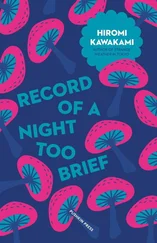Even though they were in the same neighborhood, I rarely visited—I just couldn’t bear going back home to the boisterous house where my mother lived with my older brother and his wife and kids. At this point it wasn’t about them telling me I ought to get married or quit my job. I had long ago gotten used to that particular kind of uneasiness. It was just dissatisfying in some way. It felt as if I had ordered a bunch of clothes that I had every reason to think would fit perfectly, but when I went to try them on, some were too short, while with others the hem dragged on the floor. Surprised, I would take the clothes off and hold them up against my body, only to find that they were all, in fact, the right length. Or something like that.
On the third day of the new year, when my brother and his family had gone out for a round of well-wishing, my mother made me yudofu for lunch. Yudofu had always been one of my favorite dishes. It’s not the kind of thing children usually like but, even before I started elementary school, I loved my mother’s yudofu . In a small cup she mixes saké with soy sauce, sprinkling it with freshly shaved bonito, and then warms the cup along with the tofu in an earthenware pot. When it’s hot enough, she opens the lid of the pot and a thick cloud of steam escapes. She heats the whole block of tofu without cutting it, so I can then ravage the firm cotton tofu with the tips of my chopsticks. It’s no good unless you use tofu from the corner tofu shop, and they always reopen on the third, my mother chatted away as she cheerfully prepared the yudofu for me.
It’s delicious, I said.
My mother replied with obvious pleasure, You’ve always loved yudofu , haven’t you?
I can never seem to make it the same way.
That’s because you use different tofu. They don’t sell this kind of tofu over where you live, Tsukiko, do they?
After that, my mother fell silent. I was quiet too. Without speaking, I demolished the yudofu , dousing it with the saké soy sauce as I ate. Neither of us said a word. Didn’t we have anything to talk about? There must have been something. But as I tried to think of what to say, my mind went blank. You’d think we’d be close, but it was precisely because we were close that we couldn’t reach each other. Forcing myself to make conversation felt like standing on a cliff, peering over the edge, about to tumble down headfirst.
Tsukiko, the way you describe it sounds like how I might feel if, after all these years, I suddenly encountered my wife who ran away. But this is your family, who lives in the same neighborhood as you do. Surely you’re exaggerating a bit, aren’t you? That’s what Sensei might say.
He might have pointed out that my mother and I seemed similar. Nevertheless, neither one of us was any good at chitchat. So we just avoided each other’s gaze until my brother and his family returned. The pale new year’s light shone on the veranda, reaching all the way to the foot of the kotatsu . Having finished eating, I carried the earthenware pot and small plates and chopsticks into the kitchen where my mother was at the sink. Shall I dry the dishes? I asked. My mother nodded, barely raising her head and smiling awkwardly. I smiled back just as uncomfortably. We stood next to each other silently and finished up the dishes.
I WENT BACK to my apartment on the fourth of January, and for the next two days until I had to go back to work on the sixth, all I did was sleep. Unlike while I was at my mother’s house, this sleep was filled with dreams.
After two days of work, I found myself off again. I wasn’t really tired anymore, so I just lazed in bed. I kept a teapot and teacup within arm’s reach, along with various books and magazines, and lay about while drinking tea and flipping through the pages. I ate a couple of mandarin oranges. Under the covers it was slightly warmer than my own body temperature, so I kept dozing off. Soon I’d wake again, and pick up another magazine. That was how I had forgotten to eat all day.
Back atop my unmade bed, I held toilet paper to the bleeding wound on the sole of my foot as I waited for the dizzy spell to subside. My vision seemed like a TV screen on the blink, flickering and flashing. I lay down on my back and placed one hand over my heart. There was a slight delay between the beat of my heart and the throbbing pulse of my wound.
It had still been faintly light outside when the bulb had gone out. But now, because I was still dizzy, I couldn’t tell whether or not it was twilight or if it had grown dark already.
Apples heaped in a basket by my pillow gave off their fragrance. The perfume was intensified by the chilly winter air. I always quartered my apples before peeling them but, as I lay there in a daze, I thought of how my mother used a kitchen knife to peel an apple whole, in one long curly piece. I once peeled an apple for an old boyfriend. I was never much good at cooking anyway, but even if I had been, I had no particular interest in packing lunches for him or going to his place to cook for him or inviting him over for home-cooked meals. I was always afraid that doing so would put me in a compromising position—trapped in the kitchen, so to speak. And I didn’t want him to think that he was the one who had put me there either. It may not have mattered whether or not I found myself trapped there, but somehow I couldn’t manage to make light of it.
When I peeled the apple, my boyfriend was astonished. So, you can peel an apple, huh? That’s how he said it.
I think I can manage, I replied.
Is that so?
Yes, it is.
Not long after this exchange, this boyfriend and I drifted apart. Neither one of us actually initiated it; we simply stopped calling each other. It wasn’t that I lost interest. The days just went by without us seeing each other.
You’re a bit aloof, a friend told me. Your boyfriend called me several times, to ask for advice. “How does Tsukiko really feel about me?” he would ask. Why didn’t you ever call him? He was waiting for you.
My friend fixed her gaze on me. I was bewildered. Why didn’t he ask me directly, instead of going to her? I simply couldn’t comprehend it. When I said as much to my friend, she just sighed. Tsukiko, she murmured, being in love makes people uncertain. Don’t you know what that’s like?
But as far as I was concerned, that wasn’t the point. I couldn’t help but think it had been misguided of him to go to my friend—a third party—when he ought to have brought his uncertainty to me, the one who it involved.
I’m sorry for putting you in that situation, I apologized. It’s illogical that he went to you with this. But now my friend drew an even deeper sigh.
Illogical? What does logic have to do with this?
At that point, it had already been more than three months since I had seen this boyfriend. My friend had gone on at length about this and that aspect of my relationship with him, but I had only been half listening. I was pretty sure that I wasn’t very good at this whole love thing. And if being in love required so much effort, then I wasn’t sure I wanted to be a part of it anyway. That friend ended up marrying that boyfriend a little more than six months later.
MY DIZZINESS PASSED. I could now make out the ceiling. The lightbulb in this room hadn’t burnt out, it just wasn’t turned on yet. Outside it was dark. Cold air came in through the window. It was suddenly much chillier now that the sun was gone. Lazing in bed all day had brought up memories of the past. My foot wasn’t really bleeding anymore. I applied a large Band-Aid, then put on socks and slippers, and cleaned up the mess in front of the sink.
The glass shards glimmered slightly in the light reflected from the now-illuminated bulb in the next room. I had, in fact, been very much in love with that boyfriend. I guess I should have called him back then. I had wanted to at the time, but the prospect of hearing his cold voice on the other end of the line had frozen me in place. I hadn’t known that he felt the same way. By the time I found out, my feelings had already been oddly distorted, squashed down into the furthest reaches of my heart. I had dutifully attended the wedding of my friend and my boyfriend. Someone had made a toast, saying their love was fated in the stars.
Читать дальше
![Хироми Каваками Strange Weather in Tokyo [= The Briefcase] обложка книги](/books/29150/hiromi-kavakami-strange-weather-in-tokyo-the-br-cover.webp)










